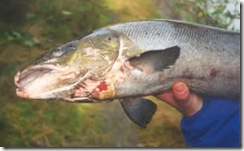 SEAFOOD.COM NEWS [CBC News] October 24, 2011
SEAFOOD.COM NEWS [CBC News] October 24, 2011
Environment Canada’s regional office in Dartmouth is cutting 18 positions, which union leaders say means important research involving toxic chemicals won’t carry on in Nova Scotia.
A spokesman for Environment Canada says 43 positions in Atlantic Canada have been affected, but that doesn’t
mean that many people will actually lose their jobs.
"Environment Canada’s key objectives have not changed, we remain focused on providing Canadians with an
environment that is clean, safe and sustainable," said spokesman Mark Johnson. Johnson told CBC News that because of the federal government’s desire to balance its budget, Environment Canada had to review its spending to focus "on priorities like improving air quality and cleaner water for Canadians."
Therefore, he said, it had to reduce funding to some programs and research areas.
"No programs were eliminated in the recent cost cutting exercise," he said in an emailed statement.
The cuts in the region are part of a cross-country reduction of 300 scientists and support staff. In Dartmouth, the union — the Professional Institute of the Public Service of Canada (PIPSC) — said the cuts include
three biologists in the priority substance risk group, who were told there wasn’t enough work.
The union said the biologists had been researching the impact of antibiotic use in farmed salmon, as well as the
impact of waste from fish hatcheries on local waterways.
Another project was evaluating a new insecticide used on P.E.I. farms.
"Air quality, water quality, it’s more the long-term effects," said Gary Corbett, president of the PIPSC. "If you don’t
have that person there, protecting the quality of life, the water, the quality of the air, then you risk losing that
quality."
The union said the cuts could be devastating.
An employee studying biological impact of acid rain was laid off in June, and that position was never refilled.
There are now no single government scientists in Canada looking at the issue, according to the union.
They also say cuts to funding means the end of research on the impact mercury has on loons at Kejimkujik National Park.
The cuts were made around the same time, according to PIPSC, as a conference on mercury as a global
pollutant — held in Halifax in June — praised the work of scientists on that subject.
"We remain focused on providing Canadians with an environment that is clean, safe, and sustainable. However, we
also need to focus spending and use our existing resources to their best advantage," Johnson said.
More job losses are expected next summer when the government decides whether to reduce Environment Canada’s budget by either five or 10 per cent.
Johnson said employees who lose their jobs will be provided with transition services for training and jobs.

Pingback: Environment Canada says job cuts will halt research on fish farming … « larrymatthews